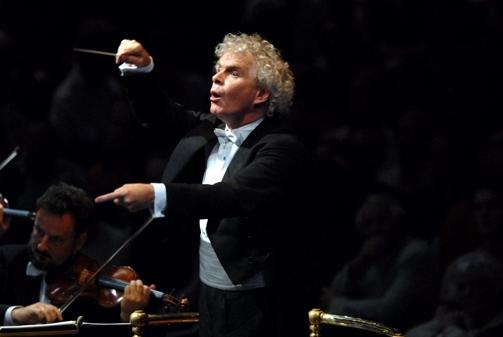Call me a paradoxically wary old Mahler nut, but I reckon that given 24 months of anniversary overkill, it might keep things fresh to catch each of the symphonies live no more than once a year. So, having heard an Everest of a First Symphony from Abbado in Lucerne last August, I thought Rattle's might be the team likeliest to do this far-from-beginner's symphony similar justice. Did its Proms Mahler One compare well with the Swiss festival love-in? In terms of orchestral sophistication and dynamic range, certainly. As for cumulative impact, ease of phrasing and the ultimate electric charge, not for me.
There was no doubt about it: we were in the presence of one of the world's great orchestras, and the sound it now makes in Beethoven is nothing like the larded beauty of the Karajan era. Rattle, with his experience of period-instrument lightness and definition, made that instantly clear with the Fourth Symphony which complemented the Mahler in the first half. Its misty slow introduction is an autumnal, minor-key foreshadowing of the cosmic spring awakening that the young Mahler stretches out to even greater lengths in his first major symphonic statement. But in this Beethoven Four there was no schizophrenic leaping between early Romantic seriousness and Haydnesque frolics.
Instead, it was all of a piece, with the most uniformly beautiful woodwind section I've ever heard providing the silver thread through the labyrinth. From singing bassoon up to soaring flute - and forgive me for not crediting the principals, as two share equal duties, though I did recognise my favourite orchestral oboist, Albrecht Mayer - they convinced me for the first time that Beethoven might have had as much genius for wind writing as Mozart. And the finale was as nimble in its articulation as the best chamber orchestras I'd usually prefer to hear in this music.
Even so, there were warning signs in the Adagio of over-interpretation to come. Indeed, Sir Simon, we know you can get extreme pianissimos from your Berlin Philharmonic players, but we don't quite need to have the art underlined. The problems came for me in the Mahler when out of the morning mists of the first movement springs the wayfarer's song about a joyous tramp through matutinal fields. Striking, perhaps, to hear it at first still wrapped in sleep, but if a singer treated the ensuing lines like this, we'd call it mannered. At times like this, the BPO/ Rattle partnership is the Renée Fleming or Elisabeth Schwarzkopf of orchestral teams: lovely sounds, shame about the artifice.
But you could never call this interpretation at any point lacking in insight or illuminating details. The magic reached its height in the time-suspended development, the masterly Berlin horn chorus stealing in with a second, even more enchanting song and the birdsong waxing psychedelic. Rattle placed the climax perfectly, assisted to the hilt by a true artist of the perfect cymbal clash among the percussion.
The trio of the rustic scherzo lilted in true upper-Austrian style; the other-worldly song at the heart of the following funeral cortege hovered on the brink of the phenomenal world. But neither of these inner movements seemed ready enough to get its hands dirty. These were still the Berlin strings digging ever so elegantly into the round-dance, a sophisticated double-bass soloist rather than an out-of-tune dirgemonger launching a minor-key version of the round known to us as "'Frère Jacques". You really need to feel how truly bizarre this intrusion of the mundane would have felt to audiences in the late 19th century. But it was only when E flat clarinet and flute added their inhuman voices to the refrain and the kletzmer-band effect briefly took wing that we felt anything like the shock of the new.
Come the finale, and I knew I was going to be making unfair comparisons with one of the most shattering stretches of concert-hall time I've ever experienced, the charge that Abbado wrought in Lucerne from the first searing "cry of a deeply wounded heart" to the hard-to-pull-off ultimate "triumphal". I was hoping, at least, that the Berliners could rekindle the final, dizzying euphoria of their Brahms First for Barenboim in Oxford's Sheldonian Theatre on May day - a weak-at-the-knees conclusion to an otherwise rather straightforward interpretation. It didn't quite happen here. The big Tchaikovsky tune that unfolds in the wake of the march mania needs a naturalness of songful phrasing that Rattle seems to me to miss, dissipating the drama, and even the last post didn't quite do it for me, though it made a clarion sound.
Articulate, as before, it certainly was, at least, and a spellbound audience kept quiet in the final haul to paradise regained. An instantaneous standing ovation from many; a lesson in orchestral brilliance, no doubt, to the many budding and recently established young conductors scattered around the Albert Hall. And the incredibly youthful Arena queue, which I was told (wrongly, as it now turns out) got cut off at 11.30 in the morning, showed no signs of being digested just before the concert, proving the Berlin/ Rattle selling power across the board. A good reason, I'd have thought, for the Proms to start thinking about setting up big screens for the disappointed outside the Albert Hall. This one could probably have filled the South Ken amphitheatre four times over.














Add comment